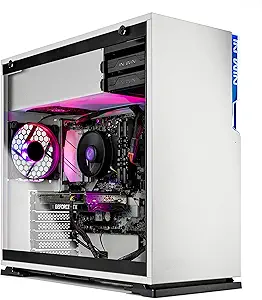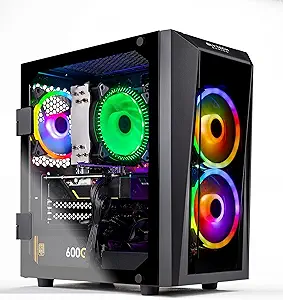Ultimate Guide to Buying a PC: Tips, Features, and Prices
Overview
Buying a PC can be a daunting task, especially if you are not tech-savvy. With so many options available in the market, it is easy to get overwhelmed. This guide will help you navigate the world of PCs and make an informed decision. From types of PCs to key considerations, features, prices, and tips, this guide covers everything you need to know before making a purchase.
Types
1. Desktop PCs: These are the traditional PCs that come with a tower, monitor, keyboard, and mouse. They are ideal for heavy-duty tasks like gaming, video editing, and programming.
2. Laptops: These are portable PCs that come with a built-in screen, keyboard, and touchpad. They are ideal for people who need to work on-the-go.
3. All-in-One PCs: These are PCs that come with a built-in monitor and all the components are housed in the back of the screen. They are ideal for people who want a sleek and clutter-free workspace.
4. Mini PCs: These are compact PCs that are small enough to fit in your palm. They are ideal for people who want a PC that takes up minimal space.
Key Considerations
1. Purpose: Determine what you will be using the PC for. If you need a PC for heavy-duty tasks like gaming or video editing, you will need a high-performance PC.
2. Processor: The processor is the brain of the PC. Look for a PC with a processor that can handle your needs.
3. RAM: Random Access Memory (RAM) is what allows your PC to multitask. Look for a PC with at least 8GB of RAM.
4. Storage: Determine how much storage you need. If you work with large files, you will need a PC with a larger storage capacity.
5. Graphics: If you plan on gaming or working with graphics-intensive applications, you will need a PC with a dedicated graphics card.
Features
1. Screen size and resolution: Look for a PC with a screen size and resolution that suits your needs.
2. Ports: Determine what ports you need for your peripherals.
3. Battery life: If you are buying a laptop, look for one with a long battery life.
4. Keyboard and touchpad: Look for a PC with a comfortable keyboard and touchpad.
5. Speakers: If you plan on using your PC for entertainment, look for one with good speakers.
Prices
PC prices vary greatly depending on the type, brand, and specifications. Desktop PCs can range from $500 to $3000, laptops can range from $300 to $3000, all-in-one PCs can range from $500 to $3000, and mini PCs can range from $200 to $1000.
Tips
1. Read reviews: Read reviews from other buyers to get an idea of the PC's performance and reliability.
2. Buy from a reputable brand: Stick to well-known brands that have a good reputation for quality and customer service.
3. Consider refurbished PCs: Refurbished PCs can be a cost-effective option, but make sure to buy from a reputable seller.
4. Look for deals: Keep an eye out for deals and sales to get the best price for your PC.
5. Check the warranty: Make sure the PC comes with a warranty to protect your investment.
FAQs
Q: What is the best PC for gaming?
A: Answer: Look for a PC with a high-performance processor, dedicated graphics card, and at least 8GB of RAM.
Q: How much storage do I need?
A: Answer: It depends on your needs. If you work with large files, you will need a PC with a larger storage capacity.
Q: Should I buy a desktop or laptop?
A: Answer: It depends on your needs. If you need a PC for heavy-duty tasks like gaming or video editing, a desktop PC is ideal. If you need a PC for working on-the-go, a laptop is ideal.
Q: What is the difference between an all-in-one PC and a desktop PC?
A: Answer: An all-in-one PC has a built-in monitor and all the components are housed in the back of the screen, while a desktop PC comes with a tower, monitor, keyboard, and mouse.
Q: Can I upgrade my PC?
A: Answer: It depends on the PC. Some PCs allow for upgrades, while others do not. Make sure to check before making a purchase.














